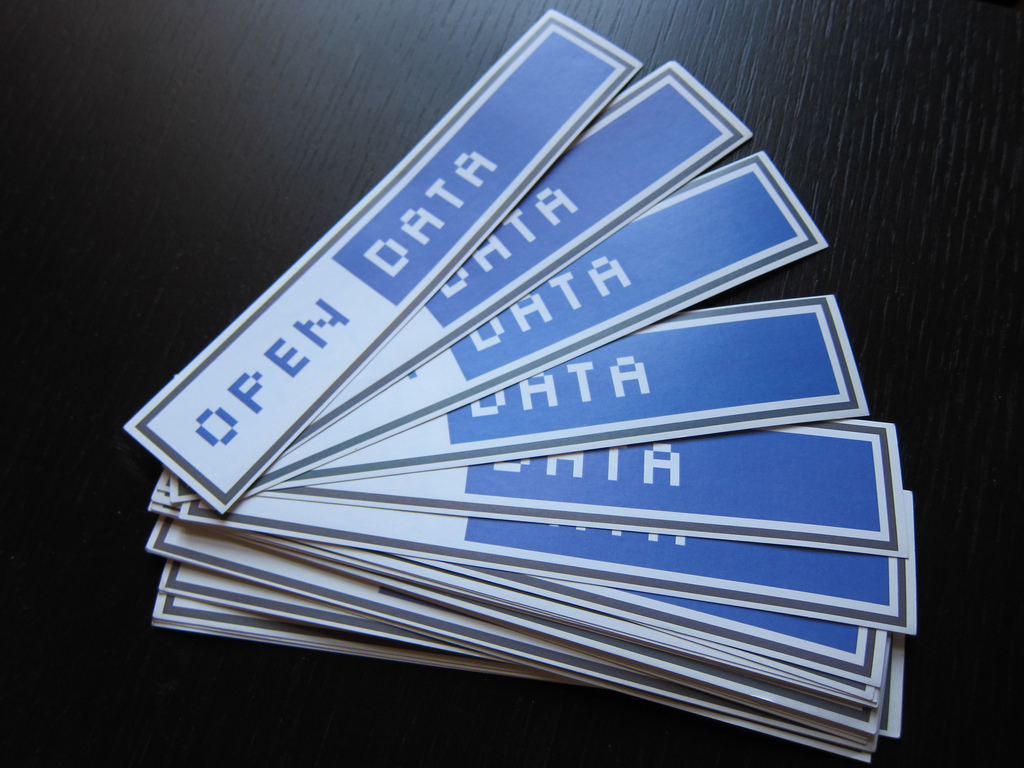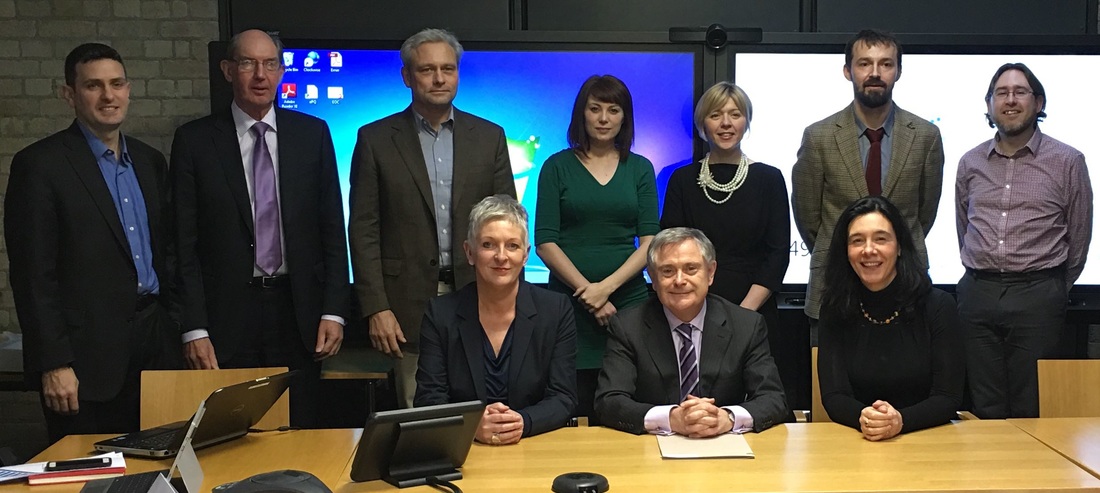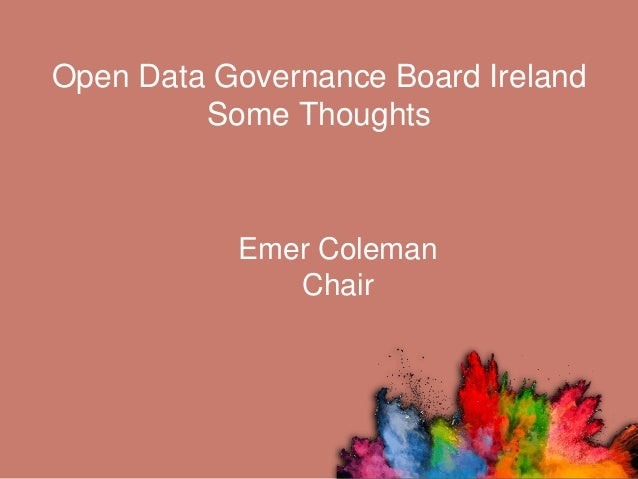Inaugural Meeting of the Open Data Governance Board Ireland
30 November 2015Front: Emer Coleman (Chair) Minister Brendan Howlin, Sandra Collins
Back: (Left to Right) Cronan McNamara, Dennis Jennings, DietrichRebholz, Suzanne Duke, Ashling Cunningham, Denis Parfenov, Daithi Mac Sithigh
The inaugural meeting of the Open Data Governance Board was held in Dublin on Tuesday 24th November 2015. Board members were delighted that the Minister for Public Expenditure and Reform, Mr Brendan Howlin TD, was able to join them to outline his views on the importance of open data as a key element of the Irish Government's Reform Agenda.
Head of the Open Data Unit, Evelyn O'Connor provided a comprehensive background briefing on the progress made to date as well as the challenges facing the Irish public service in delivering open data that meets real user needs.
Chair, Emer Coleman, then made a short presentation to the Board outlining her views emphasizing that from the beginning the strategy has to be delivery. While acknowledging that good momentum has been established in opening up Irish data she stressed the need for the opening up of significantly more data sets in open formats. She noted that out of the existing data sets released, only a small proportion are under CC-BY licensing. She also stressed the need for this opening up to be complemented with a focus on data sets where real demand exists and real benefits can be delivered especially those sets that can act as an economic stimulus in the SME sector.
Her key priorities were outlined as:
idendification of high value datasets by users
collaboration with existing data custodians in government
prioritisation of high value data sets
publication of a data release timeline
auditing of existing data sets for licensing conditions
Following these two presentations there was a broad discussion around the current open data landscape in Ireland and the Board discussed opportunities for potential quick wins and longer-term progress.
The following was agreed by the Board
Scope
The ODGB will provide a governance structure to promote engagement by all stakeholders, including public bodies. The ambition is to join up open data initiatives from central government offices, agencies and local authorities in a coherent and cohesive way.
The board expressed a preference for "doing" to encourage momentum. For example, while local authorities might have a preference to release data when the entire sector is ready it would be preferable for some leading authorities to publish incrementally so that pioneer public bodies can show what can be achieved and others can follow their example.
The Board discussed the issue of whether public bodies could be compelled to engage in the open data initiative, and agreed that encouragement to participate was their preferred approach. However, it was also noted that where necessary the Minister may consider ways of compelling engagement.
There was broad agreement that the cornerstone of most open data initiatives is collaboration and that early and frequent collaboration has a better chaance of yielding quick wins introducing new momentum. There are many officials across the public service engaged in the open data initiative and their input and suggestions will be sought out and welcomed by the Board building a coalition of the willing across the public sector.

Audits
The open data audit process being rolled out across public bodies by DPER will be the first step in identifying and prioritizing data sets for publication. This process will enable public bodies to develop publication plans to feed into the data release road map. Delivery of data sets will be agreed against the timeline to provide transparency on progress.
The audit methodology adopted for the Irish Public Service, based on Comsode, will allow public bodies and other stakeholders to track the frequency of updates and provenance of data sets and will, in turn, allow public bodies, civil society, researchers, entrepreneurs and developers to use the published data to deliver benefits.
These data audits must be accompanied by an understanding of the resource implications for the different strands of government and the board noted that the overall vision can only be achieved if matched by the relevant funding.
Engagement
The ODGB is a resource that can deliver results by sharing their experience of best practice in open data; by communicating their views of where the opportunities and challenges are; and how they can be addressed; and by identifying where the significant gaps are. The Board will consider various communication fora and use of visualisation tools to encourage and support public bodies in publishing open data as well as promoting usage by developers and the wider community.
Working arrangements
The Chair proposed and the Board agreed the practical working arrangements of the Board. These include frequency of meetings (every 2 months) and the technologies that would be used between Board members and officials to build engagement with the wider open data community.
Internally these will include Slack and Google Docs as well as social media tools such as Twitter.
The Twitter account for the Board is ODGBIreland and for the first couple of months will be managed directly by @emercoleman.
In conclusion the Chair asked board member Denis Parfenov from Open Knowledge Ireland if he would prepare a short presentation for the next meeting outlining his experience of open data release in Ireland from the civil society and his own perspective.
In addition the following next steps were agreed:
Consider the OKFN wishlist for release of datasets
Identify speakers who could share their experiences (including international actors) to discuss opportunities for progressing Open Data in Ireland
Consider further enhancements of the portal to make it more user friendly
Set up ODGB blog for use by Board members
Doodle poll to issue with potential dates for January and meetings over the coming year
The ODGBI welcomes feedback and ideas from the developer community, civil society, academia, citizens or anyone interested in the power of open data to drive societal change. Please do get in touch we'd love to hear from you. You can use the social tools mentioned above or you can email us at odgbireland@gmail.com
Board Members and DPER Secretariat
Emer Coleman (Chair) , Denis Parfenov (Open Knowledge Ireland), Suzanne Duke (LinkedIn), Ashling Cunningham (Ervia), Sandra Collins (National Library of Ireland), Dennis Jennings (Knous.ie), Daithí Mac Síthigh (Newcastle University), Cronan McNamara (Creme Global) Dietrich Rebholz (Insight NUIG),
William Beausang (Department of Public Expenditure and Reform).
Secretariat: Evelyn O’Connor (Head of Open Data Unit), Martin Troy (Open Data Unit)



 Derilinx
Derilinx